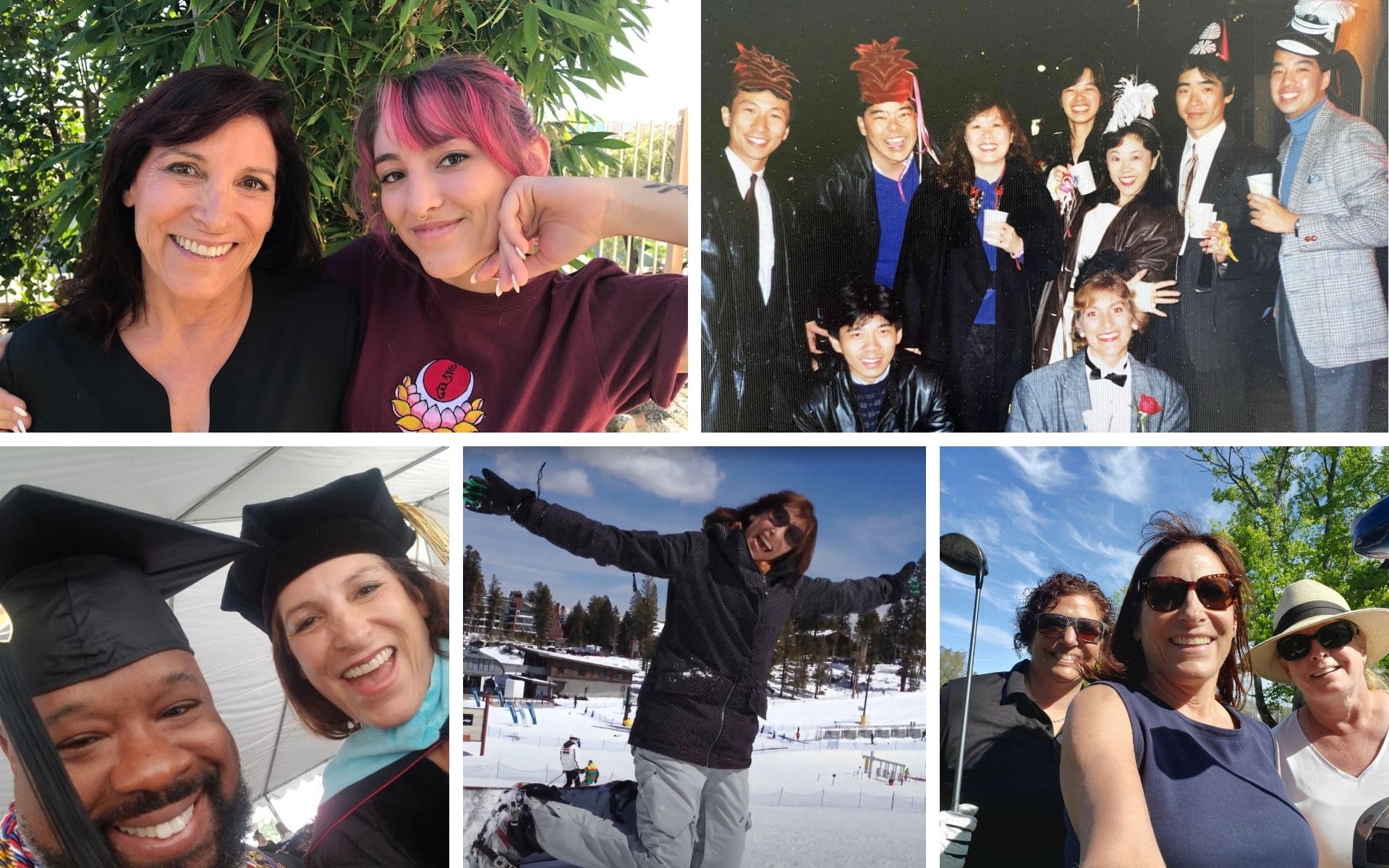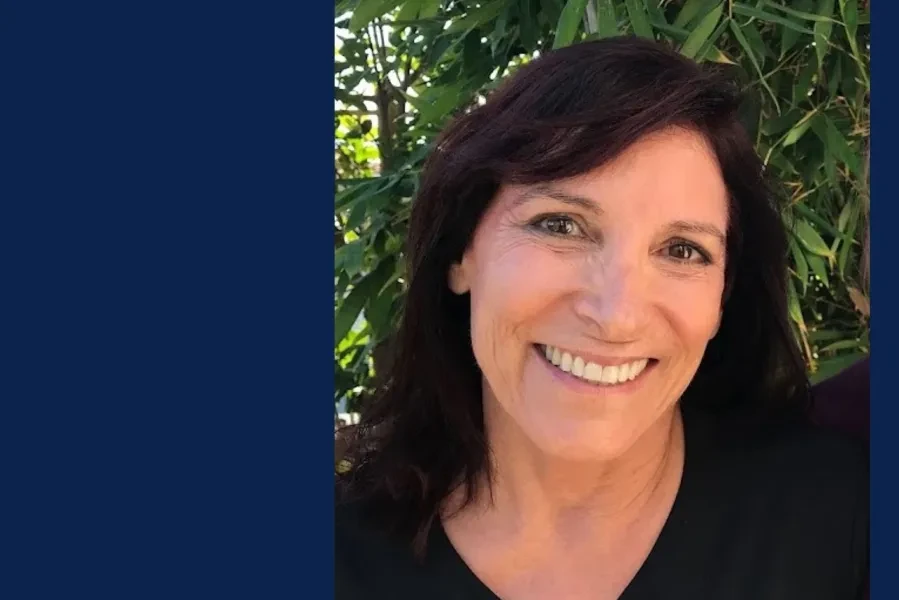It’s no joke. Dr. Michelle Warn will retire as a faculty advisor at the University of Arizona Global Campus (UAGC) on April 1st. But she’s not going anywhere.
In fact, Dr. Warn will continue as Core Faculty and Committee Chair in the Doctor of Philosophy in Education program, which is good news for those considering a doctoral degree at UAGC. Supporting students is one of her many talents, along with writing curriculum, supporting and evaluating instructors, developing program procedures and policies, and teaching doctoral level classes.
Dr. Warn holds an MA in Education Technology from San Diego State University (SDSU) and a PhD in Education from The Claremont Graduate University. Together, her education and career path propelled her to excel as a professor, faculty advisor, dissertation chair, and mentor at UAGC.
Nine years ago, Dr. Warn began her career at Ashford University, now UAGC. In the 1980s and 1990s, she worked at Apple, Inc. and then had a very successful 20-year career at SDSU.
In this blog, we will learn more about this incredible professor who has contributed to the success of UAGC students and faculty alike, and even beyond retirement, plans to continue her quest to help her students change the world.
“I really like to get to know every single one of my students, so I’ll have a lot of live sessions with students to get to know them, especially if they’re at-risk,” Dr. Warn explains. “I’ll walk them through the skillset they really need in order to be successful, and I find — especially in the doctoral program — it helps get them on the path toward the transformational experience that is being a student.”
As chair of doctoral dissertations, Dr. Warn has a knack for helping students select Doctor of Philosophy in Education thesis topics that are meaningful to them.
“I love being in the doctoral program because these students are out there to make a difference. These students are our leaders and have this passion about changing the world. I love collaborating with them and being involved with them and helping them figure out their dissertations,” Dr. Warn says excitedly.
“I have this whole method for helping students identify their topic,” she adds. “Some of the topics that my students have come up with are so exciting! I feel like I am making a difference in the world through our students, and it’s just so exciting and makes me really emotional.”
Below are some of the dissertations that current UAGC Doctor of Philosophy in Education students are working on:
- Counseling adult children of incarcerated parents
- Bullying among Native American (Lumbee) youth and how they are supported by parents and counselors
- Strong Black Women Syndrome in the Black church
- How divergent thinking contributes to entrepreneurial success in developing nations
- How a sense of belongingness contributes to retention and persistence in first-generation African American women in college
- Entrepreneurial and life skills that can be taught to South and Central American immigrant youth
- The effects of suspension policies on young African American children
In addition to teaching doctoral courses, advising faculty, and chairing dissertations, Dr. Warn had the opportunity to work on some of the early Ashford University WSCUC accreditation projects, and she led a team to develop a critical thinking model at UAGC to help students sharpen their critical thinking skills and improve their chances of success as an online student.
“It’s a six-step model that was tested in the classroom,” Dr. Warn says. “In the research, all classes that used the critical thinking materials showed improvement. And there was a significant increase of 8.3% in students who received a grade above C-. We found a significant difference in the retention of students as a result of implementing this model in the discussion boards, so we were really excited about that.”
Another UAGC project that Dr. Warn worked on for several years was called “Originality Matters,” with the goal of turning the issue of plagiarism around into helping students find their original voice.
“It all started with one of my students crying on the phone saying, ‘I’m not a cheater, but I’ve been accused of cheating, and I’m thinking about leaving the University because of being accused of cheating.’”
As a result of that phone call, Dr. Warn created the cross-departmental Originality Matters taskforce to help support students.
“It was a big thing that made some changes to the UAGC policies in order to help faculty help students develop their original voice and help them develop the skills to paraphrase, to examine what they’re learning, synthesize, and make sense of it and acknowledge the work and expertise of other authors.”
Steve Jobs Tells a Young Michelle Warn to Go Change the World
Dr. Warn started her career at Apple back when they were making the first Macintosh in Cupertino.
“Apple was nuts back then,” she says.
She recalls how Steve Jobs used to give “mind-blowing” presentations. “He would talk about, ‘You all know so much. You’ve been infused with this. You know technology that’s going to change the world, so go out there and change the world. The journey is the reward.’”
Dr. Warn started at Apple, Inc. as an administrative assistant. She worked her way up to information systems and was sent to Hong Kong, China, and Tokyo, Japan, where she lived for one year each while implementing business and technology solutions and training employees.
One of her favorite experiences about that was getting to know the people who live there.
“It’s just really an incredible experience to be immersed in the culture and see the dynamics of the Chinese corporate culture,” she fondly recalls. “It’s just so interesting to be able to be flexible enough to accept that culture and work with that culture, rather than trying to force our culture on them.”
After returning to the U.S., Dr. Warn went back to school and earned her master’s degree in education technology before beginning a career at her alma mater.
At SDSU, Dr. Warn Helps Implement One of the First Degrees Available Online
As the Internet started to explode in the 1990s, Dr. Warn was beginning a 20-year career to run the Center for Distance Learning at SDSU.
“We were charged with putting some of the first degrees online in the U.S.,” Dr. Warn says.
Further, the program had to be fully accessible to students with disabilities. “We would be up all night long for five days in a row to get courses running by Monday,” she recalls.
As the program expanded to offering degrees in the Pacific Islands, where Internet was not yet stable, they had to create courses on CD, then fly teachers out there to instruct courses. It allowed Pacific Islanders to stay at home with family while earning their degrees.
“Working in Micronesia, I used to have students give their final presentation in their native language. They would do a chant before they did their presentation. Making the student the focal point, the student’s culture, the student’s needs, immersing yourself in what it is that student is as an individual, but also a cultural and social being. What are the influences in their community and in their lives, and how do we tailor the curriculum to really what their needs are and what their interests are and what is appropriate for them?”
Dr. Warn has worked in Afghanistan to help teachers there, and she has also been working with women in developing nations in building entrepreneurial skills and ideas. In a project in Thailand, she put the class on Facebook because the students had smartphones.

Getting to Know Dr. Michelle Warn
We talked more in-depth to Dr. Warn to learn more about her career and time spent at UAGC.
UAGC: What do you appreciate most about your career at UAGC?
Dr. Warn: The ability to meet so many wonderful colleagues. The faculty are all amazing and top-notch, working one-on-one and really tailoring the curriculum to every single student, not just a little bit, but a lot, connecting their passion, connecting their goals for their career, how all that connects to the curriculum, and helping them find those inroads to understanding the curriculum.
I want to say they are more caring about the world and caring about making a difference in the world than faculty at any of the other places I’ve worked. Other staff and faculty at UAGC are truly caring, concerned human beings that want to make a difference and want to help, and they found a way to do it through their work.
UAGC: What have you learned from your students in the past year or so through the pandemic?
Dr. Warn: How hard it’s been for them. I get scared for them and just try to give them all the grace and flexibility I can. I also send them support. I sent a meditation out to one of my students. So sending supports and ideas for self-care. It’s been really tough. They’ve lost so many family members and friends, and they’ve lost jobs. It’s just super scary for them, and despite all that, they’re still pursuing a degree, which is cool.
UAGC: What is one of the biggest life struggles you have endured, and what did you learn from that experience?
Dr. Warn: I was caretaker for my mom, who had Alzheimer’s. It was pretty much day and night, focusing on her and caring for her for some years. But she lived until she was 97, and other than Alzheimer’s, she was healthy as could be. It was all encompassing. Everything revolved around my mom, and she deserved it. My parents were the greatest parents ever.
I also had chronic fatigue when I got back from overseas, and I was sick for seven years. I was very, very sick and didn’t know if I would ever get better, but just kind of gradually, I got all my energy back, which was great.
UAGC: How do you unwind and practice self-care?
Dr. Warn: I meditate. I play golf. I play tennis. I like to go hiking. I walk the dog. I breathe.
UAGC: What do you plan to do when you retire?
Dr. Warn: When I retire, I plan to join a golf league and a tennis league. I plan to go snowboarding in Mammoth to celebrate my retirement and I’m planning on going on other trips. One of my hobbies is that I like to flip houses. So hopefully, I’ll be flipping some houses. We’ll see how the market goes. I plan to take Italian classes so that I can go live in Italy for a few minutes.
UAGC: If you could give parting advice to the graduating class, what would it be?
Dr. Warn: Give yourself the grace to fall down and get back up, the space to breathe without thought, and the gratitude for how far you have come in your life. Stay present, don’t let thoughts overrun your mind, and just stick with what’s important.
--
Charlene Melson is a contributor to the Forward Thinking blog.
*Ashford University is now the University of Arizona Global Campus.
Certain degree programs may not be available in all states.
